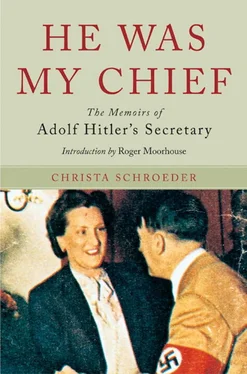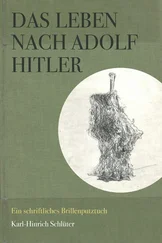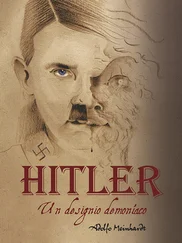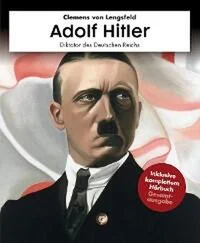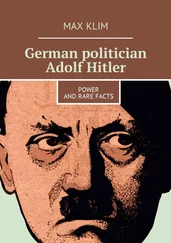Christa Schroeder - He Was My Chief - The Memoirs of Adolf Hitler's Secretary
Здесь есть возможность читать онлайн «Christa Schroeder - He Was My Chief - The Memoirs of Adolf Hitler's Secretary» весь текст электронной книги совершенно бесплатно (целиком полную версию без сокращений). В некоторых случаях можно слушать аудио, скачать через торрент в формате fb2 и присутствует краткое содержание. Город: Barnsley, Год выпуска: 2012, ISBN: 2012, Издательство: Frontline Books, Жанр: История, Биографии и Мемуары, на английском языке. Описание произведения, (предисловие) а так же отзывы посетителей доступны на портале библиотеки ЛибКат.
- Название:He Was My Chief: The Memoirs of Adolf Hitler's Secretary
- Автор:
- Издательство:Frontline Books
- Жанр:
- Год:2012
- Город:Barnsley
- ISBN:978-1-7830-3064-4
- Рейтинг книги:4 / 5. Голосов: 1
-
Избранное:Добавить в избранное
- Отзывы:
-
Ваша оценка:
- 80
- 1
- 2
- 3
- 4
- 5
He Was My Chief: The Memoirs of Adolf Hitler's Secretary: краткое содержание, описание и аннотация
Предлагаем к чтению аннотацию, описание, краткое содержание или предисловие (зависит от того, что написал сам автор книги «He Was My Chief: The Memoirs of Adolf Hitler's Secretary»). Если вы не нашли необходимую информацию о книге — напишите в комментариях, мы постараемся отыскать её.
He Was My Chief: The Memoirs of Adolf Hitler's Secretary — читать онлайн бесплатно полную книгу (весь текст) целиком
Ниже представлен текст книги, разбитый по страницам. Система сохранения места последней прочитанной страницы, позволяет с удобством читать онлайн бесплатно книгу «He Was My Chief: The Memoirs of Adolf Hitler's Secretary», без необходимости каждый раз заново искать на чём Вы остановились. Поставьте закладку, и сможете в любой момент перейти на страницу, на которой закончили чтение.
Интервал:
Закладка:
If the big table in the dining room lacked places for all lunch or dinner guests, the round table in the ante-room would be used additionally, primarily to seat the adjutants. Nearby was a sideboard with hand-painted tiles depicting scenes from Berghof life, e.g. some showing Frau Endres, who ran the household for a short while after the departure of Frau Raubal, carrying a bowl of heaped meatballs. There was also a built-in glass showcase in which very beautiful porcelain, a present from Winifred Wagner to Hitler, was displayed, together with hand-painted crockery.
At the Berghof Hitler always sat at the centre of the table opposite the window overlooking the Untersberg mountain. He would have a different female partner at his right hand for each mealtime, the secretaries also had their turn, while at his left Eva Braun and Martin Bormann had a permanent place together. The special invitees were placed directly opposite Hitler. He laid stress on having a beautiful floral decoration at table. It was essential that the best blooms should be supplied from the most exclusive florists in Berlin and Munich. Excellent floral decorations were set for state dinners. When I think of the almond bushes, the long-stemmed roses, rare orchids and gerbera amongst other expensive blooms which transformed the rooms into a literal paradise of flowers then I definitely believe that these decorations far exceeded the costs of the menu on such occasions. That at least was what was whispered.
The porcelain and silver cutlery were made to Hitler’s design. They bore the sovereignty symbol, the eagle with spread wings with right and left the initials ‘A’ and ‘H’ in the old script, the design on the porcelain being in gold. The fare was simple and traditional: as a rule soup, meat, vegetables, salad and dessert. Hitler’s household functioned like a well-run hotel. From Martin Bormann’s market garden on the Berg fresh vegetables and salads were delivered daily. The farm provided milk, eggs, red- and blackcurrant juice, grape and apple juice, honey from hives in the wooded regions of Obersalzberg and the Kehlstein. When Hitler recognised the medicinal qualities of hops he would indulge himselflater in a beer brewed for him specially. His favourite meals at the beginning of the 1930s were white beans, peas and lentils, vegetable dishes and salads. During the war when a dietician-cook was employed he followed the Bircher-Benner diet. He was sincerely opposed to meat eating, and according to Julius Schaub became vegetarian after the death of Geli Raubal. He was absolutely convinced that meat eating was harmful. As an example he cited horses, bulls and elephants, all plant-eaters, which had great strength and endurance. ‘Contrast them with dogs,’ he would say, ‘which are confirmed meat eaters and, after a bit of effort, finish up panting with their tongues hanging out.’ In his opinion meat was dead, putrefied matter, and in addition he disapproved of the cruel manner in which animals were slaughtered in the abattoirs.
Once I discussed this with Ada Klein. When I mentioned Hitler’s remarks about meat eaters she recalled an incident at Easter 1926 when she visited a matinée of the Zigeunerbaron in the Gärtner-Platz theatre. Afterwards they ate at the Café Viktoria in the Maximilian-Strasse opposite the Thierschstrasse (now the Restaurant Roma). Hitler ordered kid liver. The waiter brought a giant portion. Hitler asked: ‘Is that the liver from one kid?’ The waiter replied: ‘No, from two!’ At that Hitler remarked to Ada: ‘The human is an evil animal of prey. Two small innocent animals were deprived of life to provide a glutton with a gourmet dish. I believe I shall become vegetarian one day.’ After Geli’s death he actually did convert and never tired of holding forth from time to time during meals on the brutal methods of slaughter. When Eva Braun then gave him a pleading look to not go on about it so at the meal table because it put many guests off their food listening to the discourse, this confirmed the correctness of his opinion.
On the other hand he would go into almost poetic rapture whenever he described how his own vegetarian meal had been grown. The farmer sweeping the seed fan-wise from his hand in that great gesture with his arm as he bestrode his fields; how the broadcast seed fell to earth, sprouted and grew into a green sea of waving stems turning slowly golden yellow in the sun. ‘This picture alone’, he believed, ‘should tempt Man back to Nature and her produce, which is given to mankind in wasteful fullness.’ He would always round off by saying that he did not intend to convert anybody to vegetarianism, for if he did in the end nobody would accept his invitations to dine any more.
He would often recall the meals he enjoyed most as a child. These included bread rolls with meatballs and sorrel sauce, which his mother used to make. Marion Schönmann, a native of Vienna very often the guest of Hitler and Eva Braun at the Berghof, once joked that she would make some for him. Next day wearing a chef ’s white outfit she caused uproar in the kitchens, set the staff in high dudgeon and created an awful mess, the result of which was meatballs as hard as iron. Hitler, who enjoyed getting the better of his female compatriot, did not miss this opportunity of berating her much-vaunted skill in cooking, and suggested she should use her recipe to defend the turreted castle she owned near Melk on the Danube. Years later he still relished retelling the story of Frau Schönmann’s meatballs.
When the diners rose, he would always kiss the hand of Eva Braun first, and then that of his female partner at table. During the meal Eva Braun took little part in the conversation, at least in the earlier years. Later when her self-confidence grew she would talk if she felt so inclined. She would allow her impatience to show if at the end of the meal Hitler embarked on one of his favourite topics instead of rising. In the war years when her influence on Hitler was more certain she would even go so far as to cast looks of disapproval in his direction or ask in a loud voice what the time was. Hitler would then quickly abandon his monologue and rise from the table.
Until the war, on his walks on the Obersalzberg which led to the ‘small tea-house’ on the Mooslahner Kopf, Hitler would wear a ghastly khaki windcheater, far too long and several sizes too big for him, and a nondescript hat with a wide brim to protect his sensitive eyes. This hat was the curse of the photographers, for it only allowed them to get a shot of the lower half of his face. Eva Braun, very conscious of appearances, would often criticise his clothes, but he ignored her. Only if she repeated her criticism too often, and he saw it as a criticism of his taste would he let his annoyance show. When Eva once spoke disapprovingly of his hunched shoulders when walking he brushed this aside with: ‘Those are the great worries of state which weigh me down!’
On these walks in wartime he preferred a black cloak. He kept to well-maintained bridle paths at the sides of the farm meadows, a walking stick in his right hand, the lead of Blondi his German Shepherd in the left. He would always go in company with the newest arrival amongst the guests. It would take a comfortable half hour to reach the tea-house, built by Professor Fick in 1937 and resembling a low, tower-like pavilion. On a rocky promontory equipped with a guard rail he would then stand enjoying the view over Berchtesgaden and Salzburg, both hands resting on the walking stick. Speer is mistaken when he says that Hitler had no feeling for the beauty of the landscape. Hitler would always wait at this promontory for his guests to catch up and then all would enjoy the view together.
Once everybody had looked their fill◦– far below the river Ache curled through the valley◦– Hitler would lead the way to the tea-house. There was a cloakroom in the porch and then one entered a room of bright marble with a large fireplace. Furnishings were deep, chintz-covered armchairs at a round table. Tall, narrow windows in the south face of the tea-house allowed a good view of the mountains; the fireplace was on the north side, above it a gold-framed mirror reflected the crystal crown lights in the ceiling and the beeswax candles in wall holders. I never saw the grate lit. As a source of warmth it was superfluous, for central heating was installed below the red marble floor tiles.
Читать дальшеИнтервал:
Закладка:
Похожие книги на «He Was My Chief: The Memoirs of Adolf Hitler's Secretary»
Представляем Вашему вниманию похожие книги на «He Was My Chief: The Memoirs of Adolf Hitler's Secretary» списком для выбора. Мы отобрали схожую по названию и смыслу литературу в надежде предоставить читателям больше вариантов отыскать новые, интересные, ещё непрочитанные произведения.
Обсуждение, отзывы о книге «He Was My Chief: The Memoirs of Adolf Hitler's Secretary» и просто собственные мнения читателей. Оставьте ваши комментарии, напишите, что Вы думаете о произведении, его смысле или главных героях. Укажите что конкретно понравилось, а что нет, и почему Вы так считаете.
